Car Makes Rattling Noise When Accelerating: 12 Causes
Loose heat shield or detached exhaust system components are the most common causes of a car rattling noise when accelerating. Other causes include worn engine mounts allowing the engine to vibrate, worn suspension causing vibration, and low oil damaging cam phaser and hydraulic valve lifter. The noise could also come from a loose belt, bad pulley, exhaust leak, or worn spark plug.
Are you hearing a metal rattling noise from the engine bay or front end of your car when you hit the gas pedal? Do you feel vibrations from the engine when you press the accelerator?
Don’t worry. In this blog post, we’ll go over the most common causes of car rattles when accelerating, and what you can do to fix them.
For your convenience, I’ve designed an interactive tool that assists in diagnosing car troubles. It takes you through straightforward steps. Be sure to explore it.
- Loose heat shields, exhaust components, or worn belt pulleys can rattle at low speeds due to vibration from the engine.
- Rusted bolts, damaged exhaust system couplings, or bad motor mounts allow movement of components, resulting in rattling sounds when accelerating gently.
- Engine knocking or misfiring can translate into rattling noises that are most noticeable when initially pressing the gas pedal from a stop.
- A bent dust shield rubbing against the brake rotor will make contact and rattle when speed is low during initial acceleration.
- Worn strut mounts or cracked sway bar bushings are unable to dampen vibration properly, leading to rattling.
- Bad CV joints that are worn out cannot smoothly transfer power from the transmission, causing them to vibrate and rattle on acceleration.
What Are the Causes Of Rattle in Vehicles When Accelerating?
1. Bad or Low Transmission Fluid
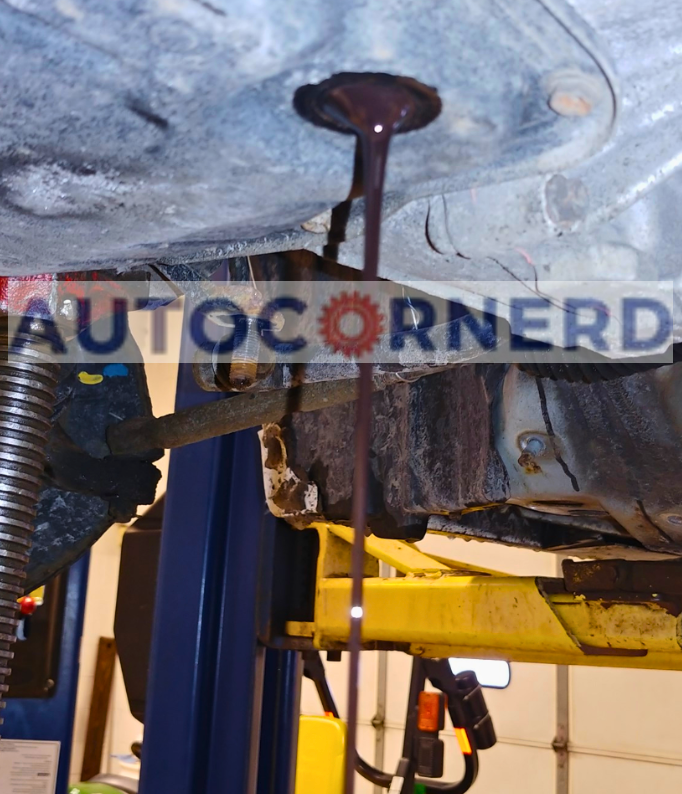
Transmission fluid is a special type of oil made just for automatic transmissions. It helps the transmission shift gears smoothly.
The transmission fluid also flows through valves to control when the transmission shifts gears. When the transmission fluid gets old, you may hear grinding or rattling noises when gear shifting. The gears will feel rough too.
Why does this happen?
The most common reason is a transmission leak. Transmission leaks can happen in the pan, seals, gaskets, or connecting lines. If a leak isn’t fixed, the transmission could run out of fluid. That causes a rattle when speeding up.
Another reason is a clogged transmission filter. The filter cleans the transmission fluid. If it gets clogged, the fluid can’t flow right.
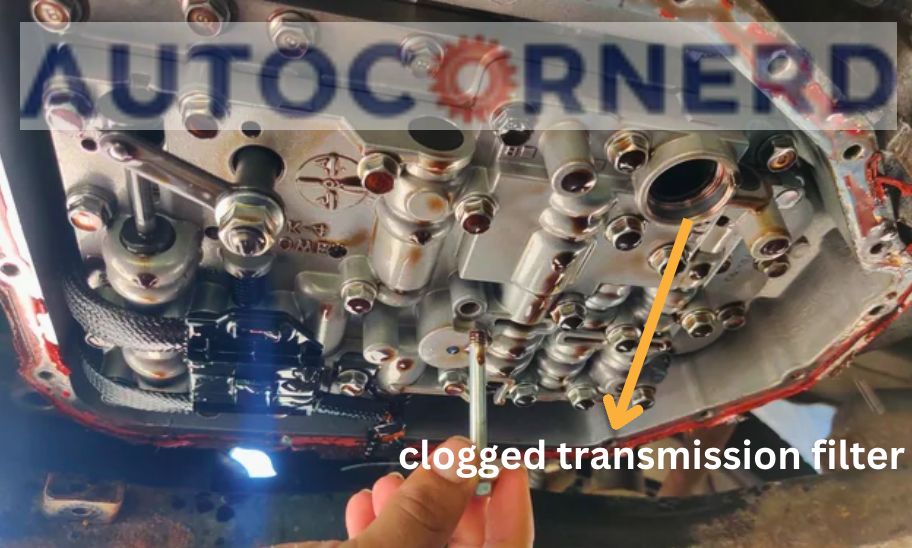
How to spot the cause?
The transmission fluid is key for smooth gear shifting. To check it, first find the dipstick under the hood. Don’t mix it up with the engine oil dipstick – they’re different.
Before measuring the fluid level, start and warm up the engine to operating temperature. Then check the dipstick. If the fluid level looks okay, next is a quality check.
Wipe the transmission dipstick with a clean white cloth. If the fluid shows no reddish tint, it needs changing. I have written a detailed guide on transmission flush to learn more.
Finally, the ultimate test is to remove the transmission pan. Check the magnet inside for metal flakes.
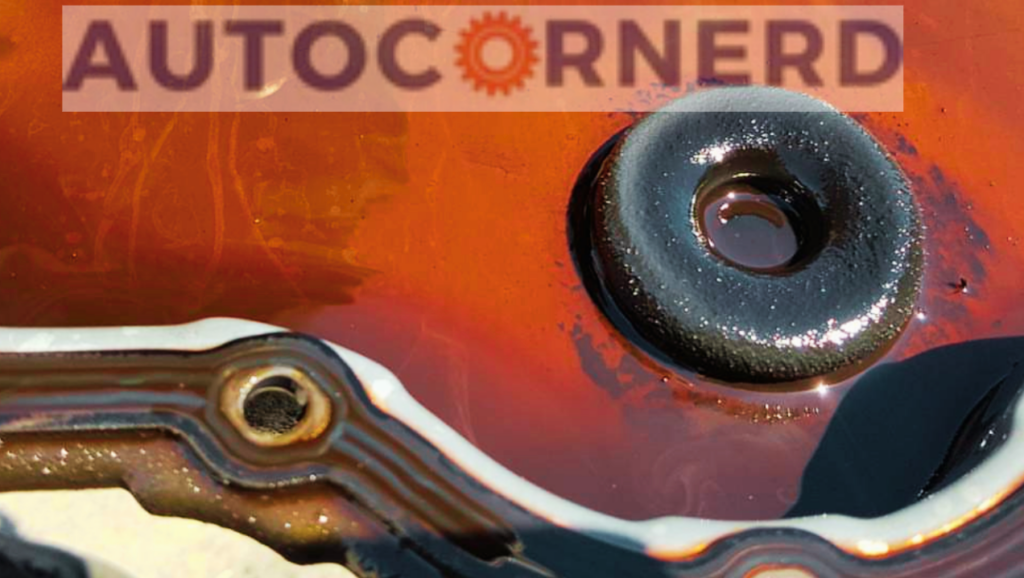
2. Low Oil Level
The engine needs oil to run smoothly. When the oil level is low, it can cause rattling noises when you step on the gas pedal. This is because some important engine parts don’t get enough lubrication from the oil.
Three parts that can cause rattling noises are the cam phasers, hydraulic lifters, and rod bearings. Let’s look at each one:
Cam phasers adjust the timing of the engine’s valves to give better performance and gas mileage. With low oil, the phasers get out of alignment. This makes a rattling sound when accelerating.
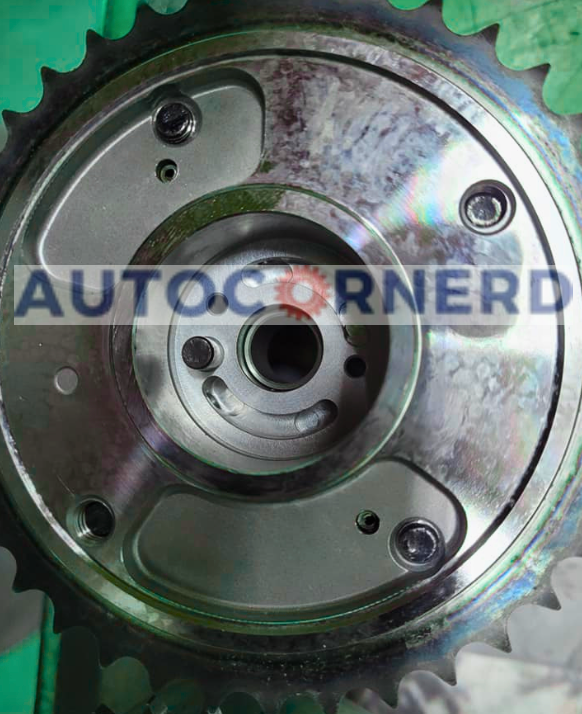
Hydraulic lifters lift the valves so fuel and air can flow into the engine cylinders. When oil is low, the lifters can’t lift the valves right. This also makes the engine rattle.
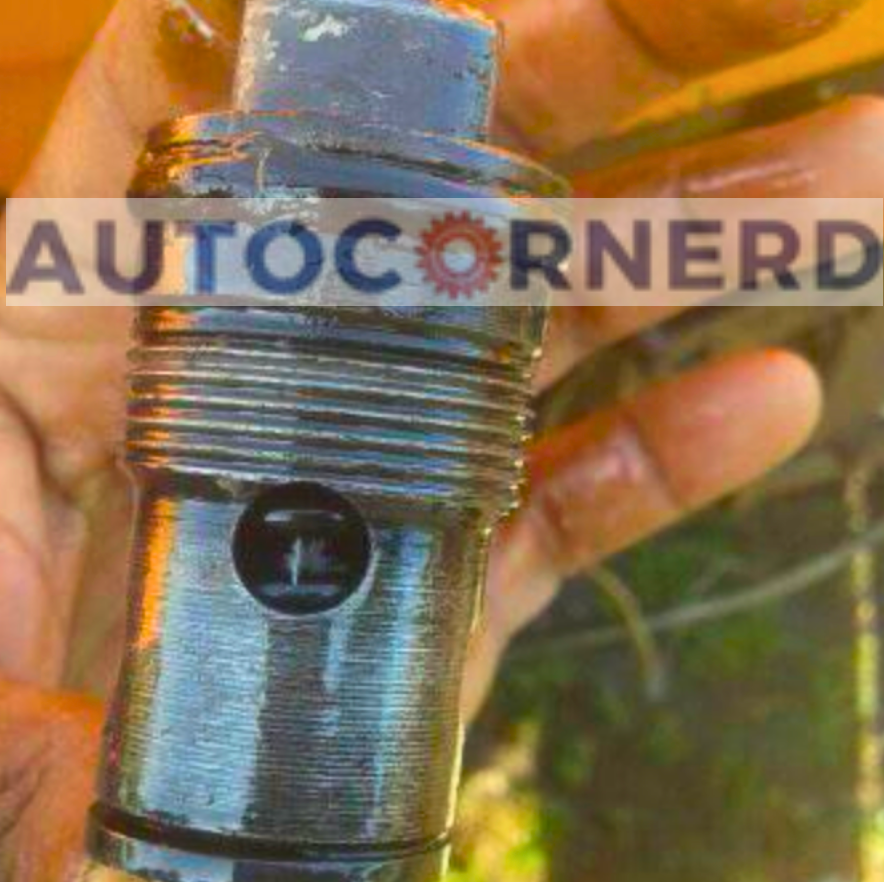
Rod bearings hold parts of the engine together. Low oil wears them out faster. Damaged rod bearings rattle when you hit the gas.
How to spot the cause?
Low oil in the engine can also turn on the low oil level light on the dashboard. So, you should first check the oil level from the oil dipstick.
If your engine is burning oil, the oil must be leaking from somewhere. In that case, you should check the coolant color. If it has a coffee-like color, it means that oil is leaking into the engine. In that case, you should especially check the engine head gasket.
There are also other spots of external oil leaks from a car. These include:
- Oil Pan Gasket
- Oil Filter
- Oil Pan Drain Plug
- Valve Cover Gasket
- Oil Pressure Sending Unit (you can find its location in your vehicle’s owner’s manual)
You can also read my guide on common oil leaks in engines to learn more. Moreover, when changing motor oil, make sure that you’re using the correct viscosity grade. For this, I’ve written a guide on 10w30 vs SAE 30 to learn more.
3. Rattling Heat Shield
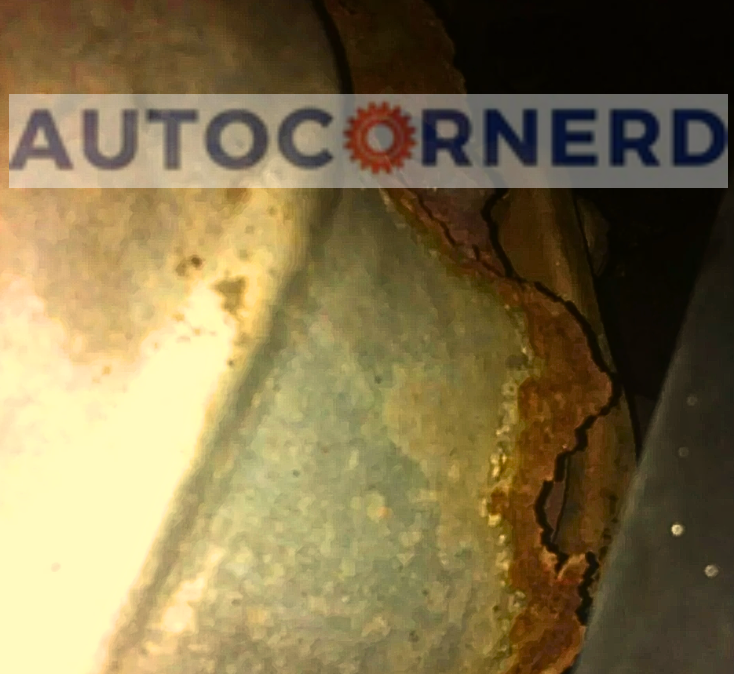
Heat shields shield other parts from the engine’s heat. When the heat shield or bolts come loose, rattling happens.
Why does it happen?
Rust and corrosion are the top causes. Road salt and weather make the heat shield corrode over time. This loosens it to rattle.
Hardware that’s loose also rattles shields. Shields bolt on with brackets and nuts. If these loosen, the shield vibrates and rattles while driving.
How to spot the cause?
Protect your hands with some leather gloves before checking the heat shields. The gloves provide a layer between your skin and the hot engine.
Let the engine idle for a few minutes first. A warmed up engine makes finding the rattle easier.
While idling, watch the area around the shields closely. Look for any parts moving as the engine runs.
Gently push on the heatshields with your hands or a tool like a screwdriver. Add pressure slowly and evenly. This prevents damage. If the rattle stops when pressed, the heat shield is likely loose.
How to fix?
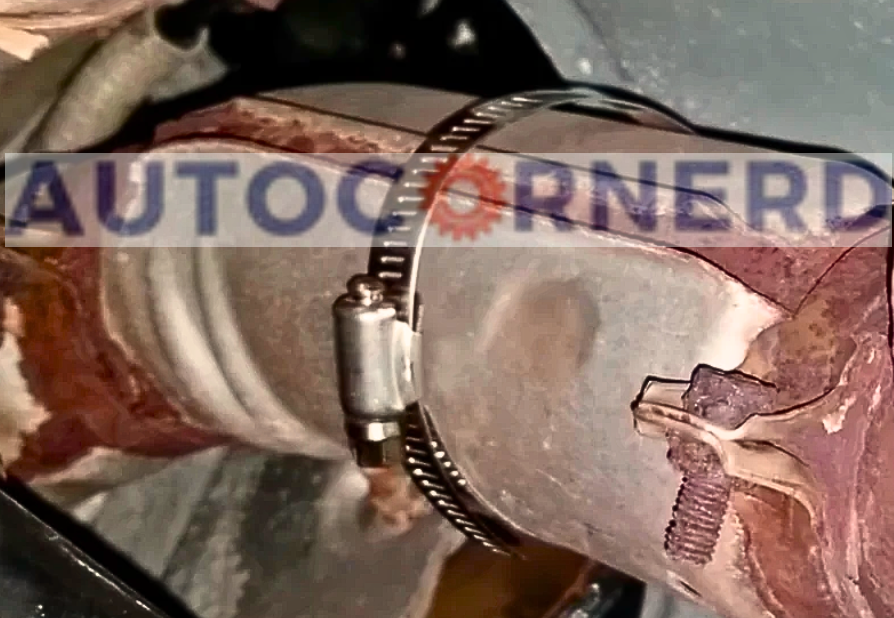
You can use a hose clamp to fix the heat shield rattle in the car. You can also try tightening the screws and bolts of the heat shield to fix the rattle.
One person faced the car rattling issue due to a loose heat shield. He simply fixed it with a worm clamp as you can see in the picture below:
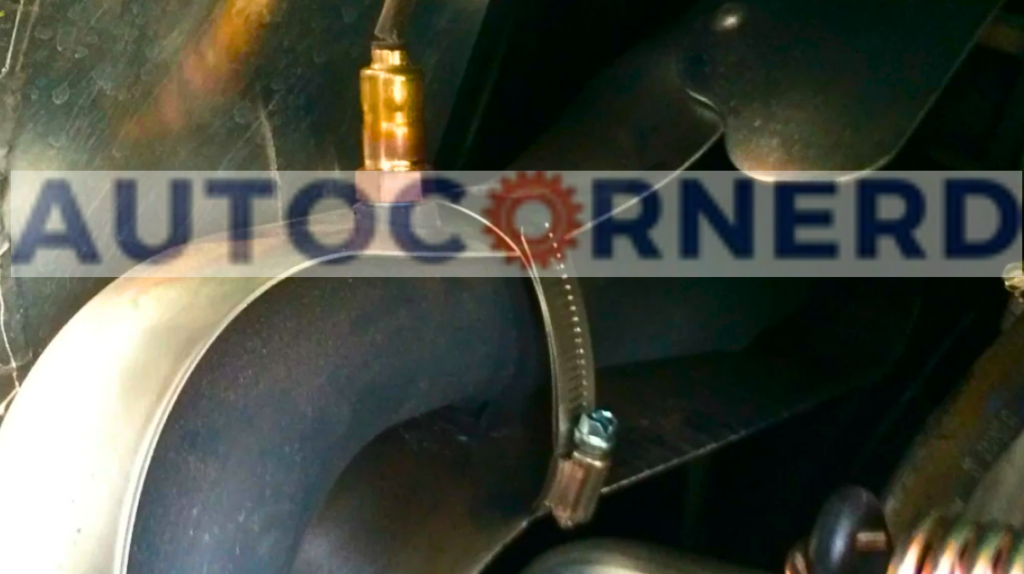
4. Loose Exhaust System
The exhaust system helps muffle the loud noises from your car’s engine. It includes parts like the muffler, catalytic converter, and exhaust pipes connecting them. If any of these are loose, you may hear rattling when you step on the gas pedal.
The main culprits of rattling sounds when accelerating are:
- The muffler shaking from loose mounting
- Holes in exhaust pipes rattling air out
A loose muffler can shake around and make a racket. Mufflers are thick and heavy to quiet the engine. But if the bolts come loose, the muffler can vibrate noisily.
Holes or cracks in the exhaust pipes can also cause acceleration rattles. Gaps let loud air and gases escape. As you speed up, the damaged exhaust system shakes and sputters.
How to fix?
Here are some tips for fixing a loose exhaust system:
- Tighten the bolts and clamps: The first step is to check all of the bolts and clamps that connect the exhaust components. Make sure that they are all tightly secured.
- Inspect the hangers: The exhaust components are held in place by hangers. These can become worn and stretched over time. In that case, you should check the hangers and replace any that are worn.
- Check for corrosion: Exhaust components can also become corroded over time. So, inspect for any signs of corrosion and replace any components that are corroded.
5. Bad Catalytic Converter
When a catalytic converter is damaged, it can cause your car to make a rattle noise when you accelerate. This is because the ceramic honeycomb inside the catalytic converter can become dislodged, causing it to vibrate against the walls of the converter.
How to spot the issue?
To determine whether a rattling noise is caused by a catalytic converter, you can bang the hammer or mallet a couple of times. If you hear the rattle then the problem is solved. You can also remove the catalytic converter and see if any ceramic falls out.
If a catalytic converter goes bad, it can also throw the P0420 code. You can check it with the OBD2 reader.
6. Bad Strut Mounts
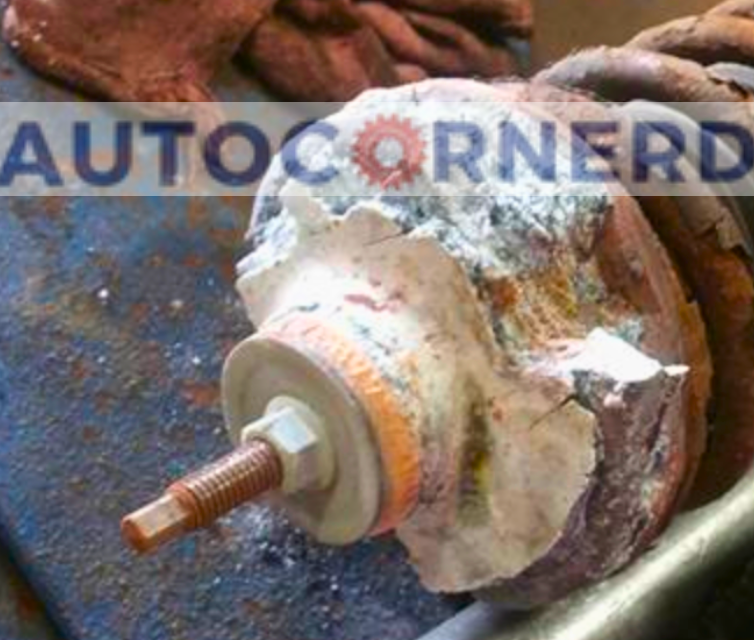
Strut mounts are rubber and metal parts that connect the suspension struts to your car. Their job is to absorb bumps and vibrations from the road. This allows for a smooth and quiet ride.
Over time, strut mounts can wear out. When this happens, they lose their ability to absorb shocks properly. If you hear rattling noises when speeding up, the problem could be coming from damaged strut mounts up front.
Here’s why: As you accelerate over bumps, worn strut mounts let the suspension strut move around too much. This unchecked movement creates a rattling sound. Healthy strut mounts would absorb those bumps smoothly instead of allowing the noise and vibration to reach the cabin.
How to spot?
There are a few signs that can indicate your strut mounts are bad. They include:
- Unusual noises when accelerating or driving over bumps.
- Loose or worn suspension components.
- Sagging suspension.
Here’s one more test you can do to identify bad strut mounts:
“Push down hard on one corner of the car. The car should go down, bounce up, then return to ride height. If it bounces more than twice, it may indicate a problem with the strut or shock absorber.”
You can also go to the front of your vehicle, raise the hood, and press down hard on the strut tower. If you hear a popping noise, it may indicate a bad strut mount.
7. Cracked Bushing Of Sway Bar
The rattling noise when accelerating can be from cracked or worn sway bar bushings. These rubber or polyurethane parts connect the sway bar to the frame. Their job is reducing body roll and making the ride stable.
If the bushings crack or wear out, they loosen and rattle over bumps. The bar is no longer tight to the frame. This allows it to shake around when driving.
The most recommended bushing for a sway bar is Moog Stabilizer Bar Bushing.
8. Loose or Bad Motor Mounts
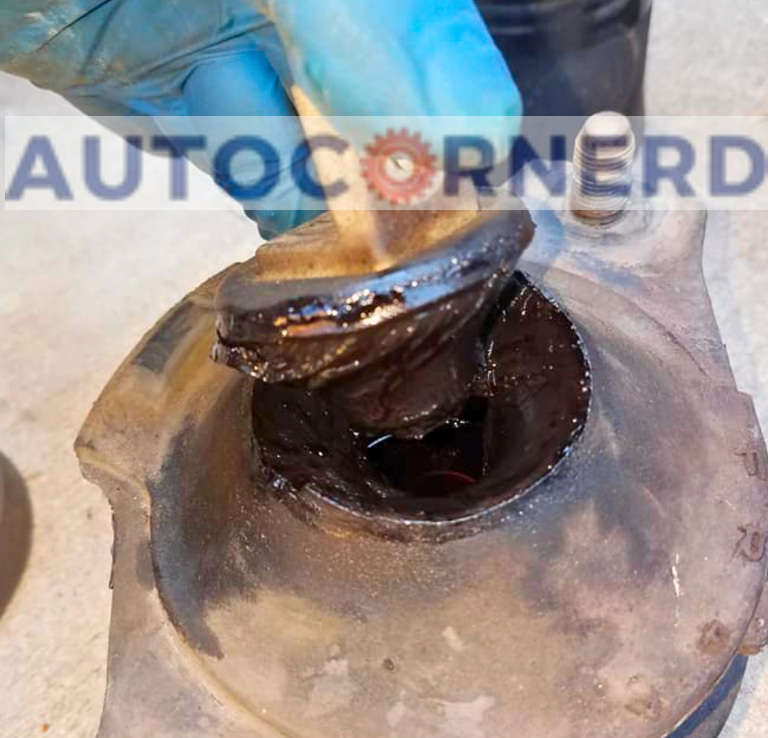
Loose motor mounts can make the car rattle when speeding up. The motor mounts are an important part of the engine and transmission in a car. Made of rubber or steel, their job is to soak up vibrations and hold the engine and gearbox tight.
When the mounts get loose over time, the engine and transmission can slide around. This lets them knock into other parts when pushing the gas pedal. The loose mounts can’t keep things locked down like they should.
How to spot?
Look close at each mount to check for cracks, tears or sagging rubber/metal.
Also try this: Park with the brake on. Give some gas while watching the engine. It should barely move. If it shakes a lot, a mount could be shot.
The same test might clunk if a mount is loose. Check front and back mounts by shifting to drive/reverse while testing.
9. Bad CV Joints
If you have a forward wheel drive car, damaged CV joints can make rattling or ticking noises in the front of the engine.
The CV joints connect the driveshaft to the gearbox to transfer power from the engine to the wheels. When the CV joints get worn or damaged, they can cause rattling noises and other issues with your car’s performance.
The CV joints are usually made of rubber boot enclosing grease and ball bearings. Friction, wear and tear can damage them over time.
As the wheels turn, the CV joints let the driveshaft move up and down without sticking. This keeps the wheels touching the ground even when turning or speeding up.
The most common cause of a bad CV joint is lack of lubrication. Over time, the lubricant dries up, making it harder for the joint to move freely. This wears down the joint, causing a rattle when accelerating.
How to spot?
If you’re observing grease stains underneath your vehicle, the chances are that the rubber boot of the CV joints is cracked.
10. Engine Knocking
Engine knocking happens when there is a rattling noise from the engine bay when accelerating. This is caused by the fuel not burning fully in the engine cylinders.
When the air and fuel mix is wrong, the fuel explodes in the cylinder instead of burning smoothly. This makes the knocking sound.
What causes this?
There are some common reasons engine knocking happens:
- Bad spark plugs: Spark plugs light the air and fuel in the engine. If they are old or broken, that mix won’t ignite right.
- Faulty fuel pressure regulator: This part keeps fuel pressure steady. If fuel pressure regulator is bad, pressure drops and the air-fuel mixture won’t burn properly.
- Clogged fuel injectors: These spray fuel into the engine. If they get clogged up, not enough fuel gets sprayed in. This makes the air-fuel mixture wrong.
Moreover, incomplete combustion can also throw engine misfire trouble codes. You can use this OBD2 tool to check codes.
11. Worn-out Serpentine Belt Pulleys
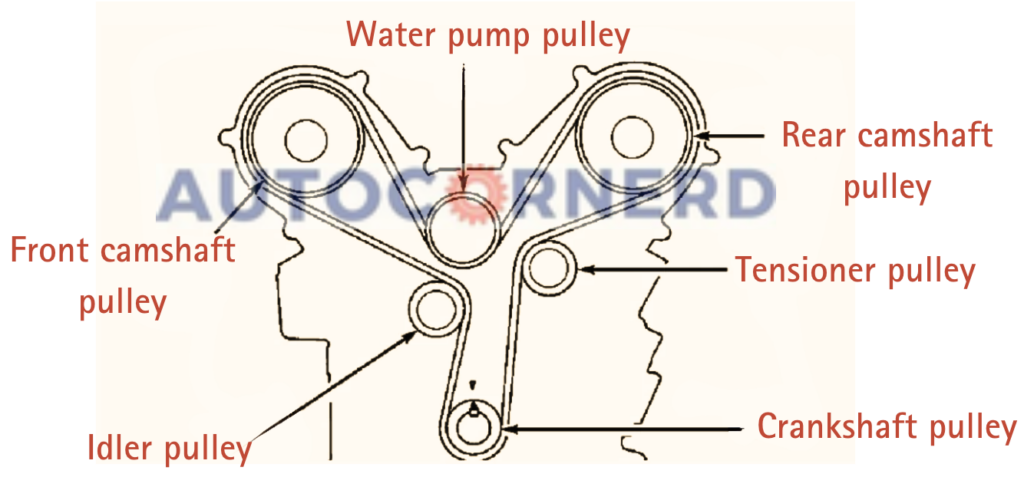
The serpentine belt is a part found in most vehicles nowadays. This long belt wraps around pulleys in the engine, including the idler pulley, tensioner pulley, and more pulleys.
The job of the serpentine belt is powering parts in the engine, like the power steering pump, AC compressor, and alternator.
When the serpentine belt pulleys get worn out, they can’t keep the belt tight anymore. With a serpentine belt not tight, it can move around and make a rattling noise when you step on the gas. The worn out pulleys are why you hear the rattling.
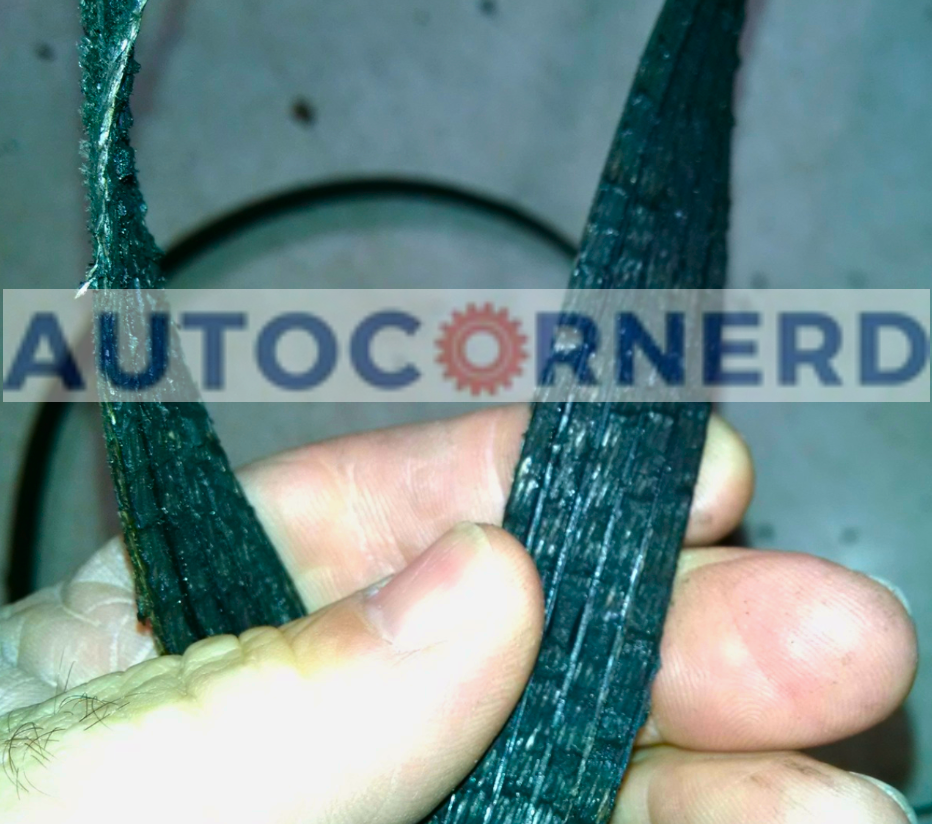
How to spot?
The idler pulley should be tight. If the idler pulley has any side-to-side play, it will cause the serpentine belt to become loose. Also, check if the serpentine belt has any signs of wear.
12. Dust Shield Is Touching The Disc
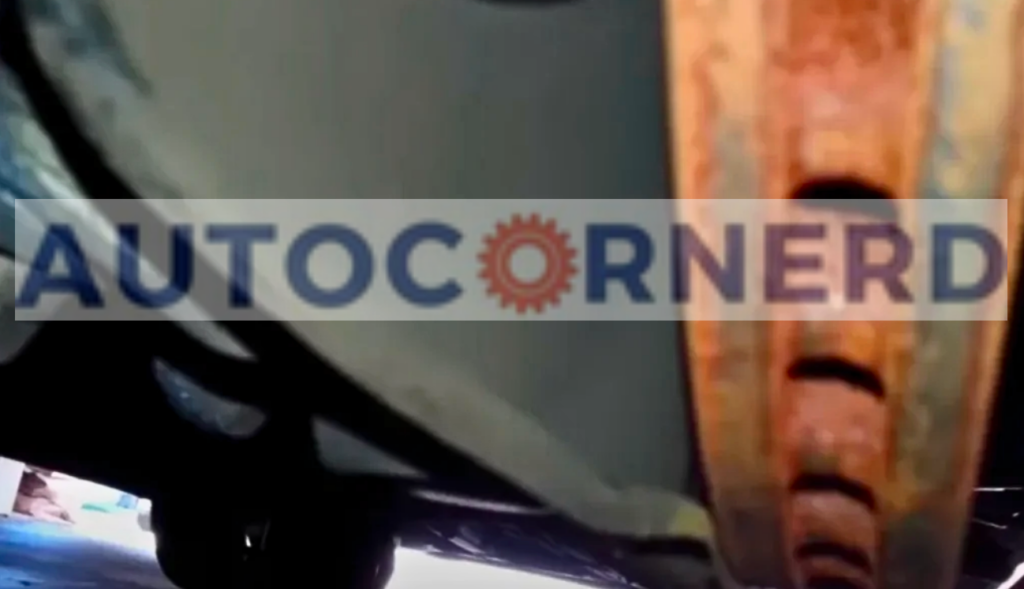
The dust shield keeps dust away from the brake discs and other parts. The shield is made of metal or plastic. It connects to the wheel assembly of the car.
If the dust shield is too close to the brake disc, it can make a rattling sound up front when you step on the gas.
This happens because the dust shield vibrates on the spinning brake disc. The dust shield gets bent or put in wrong. This makes it rub on the brake disc as it goes around.
Rattling Sound When Accelerating At Low Speed
Loose exhaust or heat shields are the most common causes of rattling sound when accelerating at low speed. Moreover, rusted bolts or clamps of exhaust system components also result in rattling noise when accelerating at low speed.
Furthermore, if your vehicle shakes at idle or at low RPM but smooths out while driving, it can also result in rattling noise.
Final Thoughts
In summary, the rattling noise from a car when pressing the gas can happen due to many reasons. The most common reasons are:
- Loose heat shields
- Broken exhaust parts
- Worn engine mounts
- Bad strut mounts
- Cracked bushings on the sway bar
- Loose motor mounts
- Bad CV joints
- Engine knocking sound
- Worn pulleys on the belt
- Dust shields touching the brake discs
To find the issue, check under the hood when the engine is idling and gently pushing the gas pedal. Look for leaks. Test if parts are loose. Check for any trouble codes. Fixing rattling sounds quickly can prevent more damage and expensive repairs later.
Some First Hand Experiences Shared By Users In Different Communities
Our team conducted research across various online communities, forums, and subreddits to gather user comments and opinions on “car rattling when increasing speed”.
User 1 says:
Own a ’10 Subaru Outback. Started hearing a rattle when accelerating uphill. I suspected exhaust issues, but after a thorough inspection, it turned out to be a loose heat shield above the catalytic converter. Fixed it myself with a metal hose clamp.
User 2 says:
In my ’05 Nissan Altima, I noticed a rattling noise when accelerating. After some online research and checking the car, I found out it was due to a failing catalytic converter. Had to get it replaced, which was a bit pricey but solved the issue.
User 3 says:
My ’08 Toyota Prius started rattling when accelerating. I’m no mechanic, but with a little help from a Prius forum, I found out it was due to worn engine mounts. Had them replaced at a local shop, and the car’s been smooth since.
User 4 says:
Experienced a weird rattle on my ’15 Mazda CX-5, especially during low-speed acceleration. Initially, I suspected engine trouble, but after some research and a bit of poking around, I discovered it was a loose plastic underbody panel. Secured it back with new fasteners and the noise was gone.
